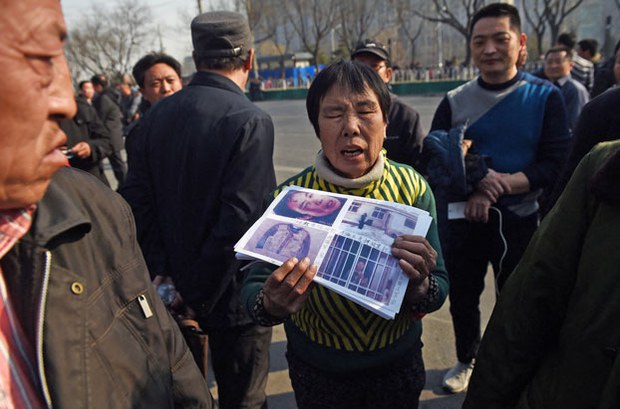Authorities around China are tightening security measures around people who complain about the government, dispatching “interceptors” to stop anyone with a grievance from lodging petitions ahead of regional People’s Congresses later this month, petitioners and local residents said on Thursday.
Provincial governments have started announcing dates for regional People’s Congress and Chinese People’s Political Consultative Conference sessions, which are typically held in mid-to-late January, ahead of the National People’s Congress in Beijing in early March.
A petitioner from the southwestern province of Sichuan who gave only the surname Yang said she was recently intercepted on a petitioning trip to Beijing, and forcibly brought back to the provincial capital Chengdu recently.
“We were stopped by Beijing police at Changqiao, who checked our ID cards,” she said. “They told the [Chengdu] interceptors that they were not to abuse us physically or verbally when they got us back home.”
China’s army of petitioners, who flood the ruling Chinese Communist Party’s official complaints departments daily, frequently report being held in unofficial detention centers known as “black jails,” beaten, or otherwise harassed if they persist in a complaint beyond its initial rejection at the local level, even if they follow legal channels.
They are often escorted home forcibly by “interceptors” sent by their local governments to prevent negative reports from reaching the ears of higher authorities, where they face surveillance, violent treatment and possible detention on criminal charges, particularly during major political events or on dates linked to the pro-democracy movement.
A rights activist in the northeastern province of Liaoning who gave only the surname Zhang said “stability maintenance” operations are in full swing where he lives.
“People are being detained on a daily basis,” he said. “They’re holding a lot of petitioners in the detention center.”
“People from the neighborhood committee won’t let you go anywhere — all the petitioners know that security guards and auxiliary police will turn up the moment they make any kind of move,” Zhang said.
Mobilizing ‘interceptors’
A resident of the northern port city of Tianjin who gave only the surname Li for fear of reprisals gave a similar account.
“They started arresting people a few days ago,” she said. “If you have ever petitioned [the government], they won’t let you board a bus.”
“There are more people intercepting petitioners than there are petitioners right now,” she said, adding that neighborhood committees, the most local unit of the Chinese government, are also mobilizing “interceptors” to make sure nobody from that neighborhood is seen petitioning in provincial capitals and other major cities during the People’s Congress season.
Sometimes, they don’t even wait to see if people are planning a petition, Li said.
“In a lot of places, they just go right ahead and detain you if you have ever petitioned,” she said, citing the recent detention of petitioner Lin Minghua in Beijing for no obvious reason.
A Beijing-based petitioner who gave only the surname Zhou said that the provincial and municipal People’s Congress season is a politically sensitive time for the authorities, and the government is stepping up stability maintenance operations aimed at preventing public dissent or protest before it gets under way.
“All petitioners, rights activists and dissidents are targeted by the government [at this time] for stability maintenance,” Zhou said.
A move to neighborhood ‘grids’
China is moving ahead with plans to shift local law enforcement from police stations to neighborhood “grids,” where local volunteers and teams of vigilantes will enforce the law and residents will be encouraged to inform on each other, the Public Security Ministry announced in March 2023.
Authorities across the country are starting to lay off auxiliary police officers and merge local police stations to outsource much of their daily work to neighborhood officials and local militias under a “grid management” system.
The shift will likely intensify China’s “stability maintenance” operations – a system of coercion and surveillance that seeks to prevent acts of defiance against the ruling Chinese Communist Party before they take place.
Shanghai-based petitioner Ma Yalian, whose home was forcibly demolished by local authorities, said it scarcely matters whether petitioners stick to legal channels or not – they are still likely to be targeted.
“There’s actually no such thing as legal or illegal petitioning,” Ma said. “You are legally allowed to report issues.”
“But now they say it’s illegal, and control [petitioners] very tightly for stability maintenance,” she said. “They don’t even abide by their own laws any more.”
Provincial People’s Congresses will be held in Yunnan province on Jan. 17, in Hebei on Jan. 21, in Shanghai, Tianjin, Liaoning, Jiangxi, Hainan and Ningxia on Jan. 23 and in Xinjiang and Inner Mongolia on Jan. 30, according to recent media announcements.
